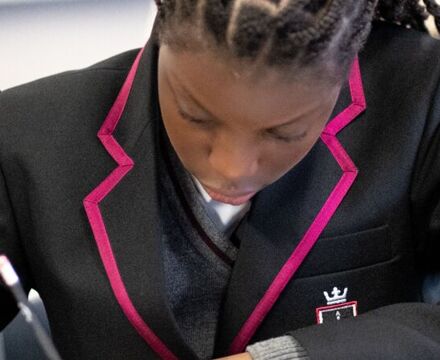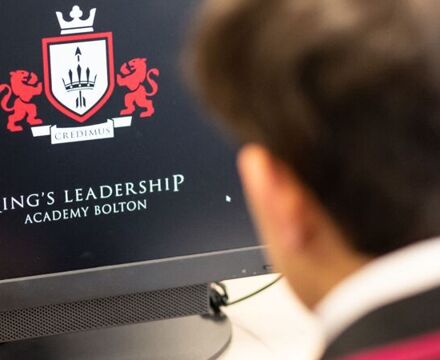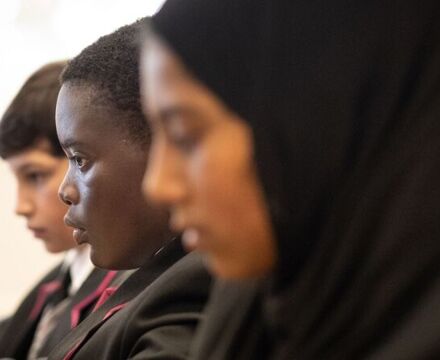Our Curriculum
“If I have seen further than others, it is by standing on the shoulders of giants” Isaac Newton
When asked to sum up the remarkable achievements of his lifetime, the father of modern science and mathematics, Sir Isaac Newton, uttered these words. For him all his discoveries and achievements could not have been achieved without the hard work and knowledge of those who went before him from antiquity, through the Renaissance up to the Enlightenment. For the students of King’s Bolton we share this philosophy, for them to become successful citizens in tomorrow’s world they must have a firm grasp of a broad range of knowledge. The curriculum we offer all our students stems from this belief.
Overview
It is our ambition at King’s Bolton to match the unrivalled success of the 1 in 15 young people presently educated in the fee-paying sector. We believe ‘Credimus’ that every child, regardless of background or starting point can:
- Vision: have the choice of selecting a good university (or suitable equivalent), following their chosen career path and creating their ‘Legacy’
- Mission: become a successful, contributing citizen ready for tomorrow’s world.
- Specialism: be successful at all levels by living the ‘ASPIRE values’ and demonstrating a willingness to challenge the status quo, thus creating the need to develop leaders of tomorrow.
King’s Bolton aims to operate as a ‘free independent school’ in the state sector, and to fulfil this duty it will not charge fees nor will it ever be selective in its efforts to deliver the academy’s educational opportunities.
The King’s Curriculum is aspirational, with a broad provision balanced between the academic, creative and leadership arcs. The academy has a strong commitment to equality of access and to ensuring that the provision remains high quality for all learners.
The King’s Curriculum is rigorous and has been designed to follow a vocabulary-rich, knowledge-based approach. It is hypothesis-led and embeds opportunities for intellectual habits and independent thought throughout. Our high expectations approach ensures that students are stretched academically across the three arcs in a way that leads to deeper cognitive processing. Appropriate curriculum planning has taken place to ensure all students access a broad curriculum.
The King’s curriculum intentionally values the scholarship of traditional subject areas in their pursuit of truth and meaning. In doing so the teachers tending to the curriculum consider the disciplinary nature of their subject domain first, distilling from this to schemes of work and individual lessons.
Curriculum Principles
Knowledge-Based
Evidence from cognitive science and studies of different schools show that a knowledge-based curriculum is the most effective. There is also strong evidence to suggest it is particularly important for pupils from disadvantaged backgrounds.
By a ‘knowledge-based curriculum’ we mean two things: The curriculum should have strong, formal foundations in traditional subjects. The curriculum should be structured carefully so that students are building on what they already know.
At King’s Bolton, we firmly believe that a knowledge-based curriculum is best for producing well-educated, creative people who can thrive in the 21st century,
By a ‘knowledge-based curriculum’ we mean two things: The curriculum should have strong, formal foundations in traditional subjects. The curriculum should be structured carefully so that students are building on what they already know.
At King’s Bolton, we firmly believe that a knowledge-based curriculum is best for producing well-educated, creative people who can thrive in the 21st century,
Vocabulary Rich
Building our students' vocabulary is central to the King’s curriculum. Each lesson/series of lessons is based around a ‘key’ subject-specific word, designed to increase the child’s Tier 2 and 3 language proficiency. Time is spent exploring the etymology of these keywords and breaking them down to their Latin/Greek roots. This enables students to further build their vocabulary and decode words.
Academic skills/Independent Learners
The King’s curriculum seeks to create students who understand their strengths, abilities and interests and are capable of utilising and applying critical and creative thinking to reason through and solve complex problems.
Intellectual Habits
The King’s curriculum seeks to embed within our students' habits such as fierce concentration, thoroughness, accuracy, reflection, strategic thinking and intellectual volition in all that they undertake.
Diverse
Diversity of thought, experience and knowledge is a crucial competency to becoming a successful citizen. Therefore the King’s curriculum will seek to offer students different perspectives, alongside common schools of thought and the English Canon.
Inclusive
The academy is committed to equal access to opportunities for all students, regardless of background or additional needs. We also recognise that SEND is not synonymous with low attainment and therefore believe that all students should have the same access to a stretching and challenging curriculum. SEND at our academy is a whole school responsibility and teaching and learning adapted for all students is the first port of call.
Remote Learning
All King’s lessons are uploaded to Google Classroom so can be accessed by students inside and out of school. In the event of full remote learning for whole classes, students will follow their normal timetable on Zoom, with the same high standards of attendance and effort required from all students.
Implementation of the Curriculum
Implementation of the Curriculum
The structure of the King’s Curriculum allows all students to access a broad and balanced academic experience. By increasing the school day we have created enough time to cater fully for the academic, creative and character development necessary for our students to achieve their ‘Legacy’ and become successful citizens. Therefore each student has 28 hours of taught curriculum time each week, alongside this students also complete the Lesson 0 programme (see below) which adds an extra 3 ¾ hours of contact time to a student’s weekly timetable.
Key Stage 3 - Years 7, 8 & 9
We consider the Foundation programme as the important years to instill the necessary intellectual skills for success and give students access to a broad and balanced curriculum. To promote this, the academy has a strong focus on ensuring that each of our students have the appropriate standards in literacy, numeracy and oracy prior to graduating onto the senior programme. The curriculum at KS3 also includes the development of study habits, learning strategies, personal organisation and time management to help students master their learning
In Year 9, using the time gained through our extended school day, students will get a chance to spend more time studying subjects they are passionate about. During this year no subjects are ‘dropped’ instead students ‘Major’ and ‘Minor’ in the subjects they will be continuing studying to GCSE level, therefore allowing full coverage of the National Curriculum. The curriculum content will not merely begin the GCSE course, but instead will focus on preparing students for further study in that subject by providing broader contextual knowledge, as well as allowing the study of diverse and often overlooked topics in that subject area.
Due to the school currently being situated on a temporary site we are taking steps to broaden our curriculum further offering Drama at KS3 from 2021 (KS4 from 2023) and Food Technology from 2023.
Key Stage 4 - Year 10 & 11
During Years 10 & 11 students will focus their studies on the subjects they will be examined at the end of KS4. The King’s Curriculum allows all students to complete the English Baccalaureate (English, Mathematics, Science, History/Geography, MFL-Spanish) alongside this all students will study an IT qualification (either Computer Science or iMedia) as well as Religious Studies GCSE. Students will also study one ‘Creative’ subject from either PE, Art or Music.
Qualifications
| Core Subjects | Science | Humanities | Creative Arc |
|---|---|---|---|
| GCSE Mathematics | GCSE Combined Science | GCSE History | GCSE Art & Design |
| GCSE English Language | GCSE Chemistry | GCSE Geography | GCSE Music |
| GCSE English Literature | GCSE Biology | Cambridge National Physical Education | |
| GCSE RE | GCSE Physics | GCSE Drama GCSE Food Technology | |
| GCSE Spanish | |||
| GCSE Computer Science | |||
| Cambridge National Creative iMedia |
Delivery of Curriculum
For a curriculum to achieve its desired goals it must be delivered effectively and consistently to all students. Therefore at King’s Bolton, we seek to only use evidence-based teaching practices which focus on how a child learns and retains knowledge, and then to ensure our staff are properly and continually trained to deliver the curriculum effectively.
Lesson 0
The Lesson 0 programmes consist of 5 x 45 minute sessions throughout the school week. In Foundation,s these sessions have a literacy focus designed to ensure all students reach their chronological reading age by the end of the Foundations. These sessions also allow for the completion of comprehensive literacy and numeracy interventions as well as the delivery of our PSHE curriculum.
Pedagogy
The chosen pedagogy of King’s Bolton takes inspiration from two key sources. Firstly Doug Lemov’s ‘Teach Like a Champion’, as well as Rosenshine’s Principles of Direct Instruction. All staff receive a copy of these texts when they are appointed to the school and regular CPD ensures staff are confident in the techniques, most importantly that of effective teacher modelling, which is central to the delivery of the King’s curriculum
Cognitive Science
At King’s Bolton, our teaching practices are firmly rooted in an understanding of how knowledge is retained and applied. The King’s curriculum is structured to allow ample opportunity for interleaving, retrieval practice and knowledge quizzing based firmly on an understanding of how memory works.


